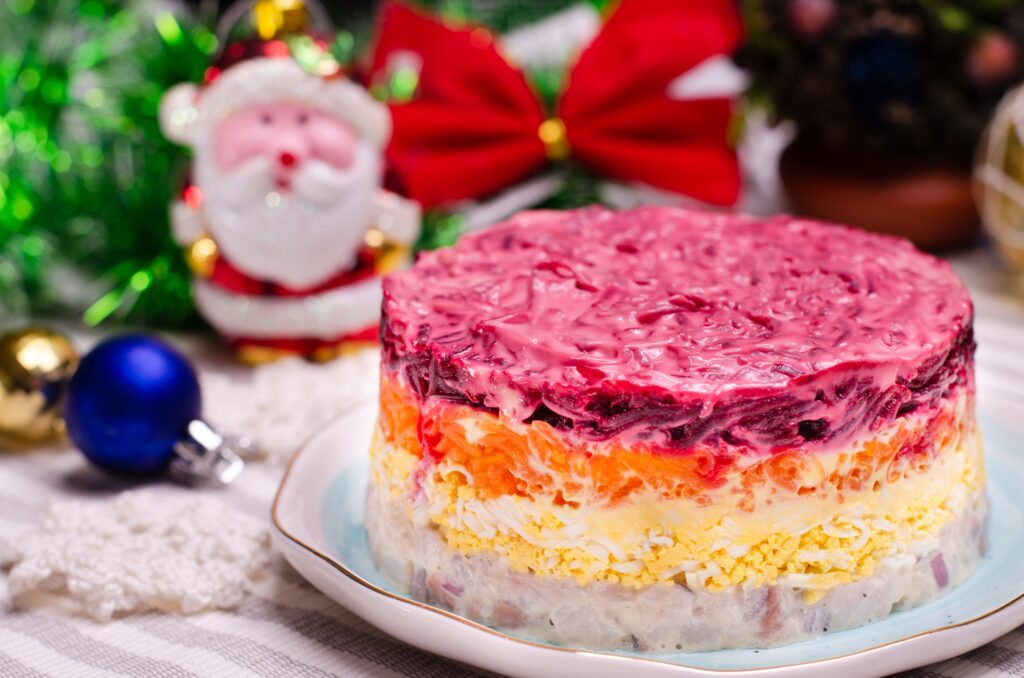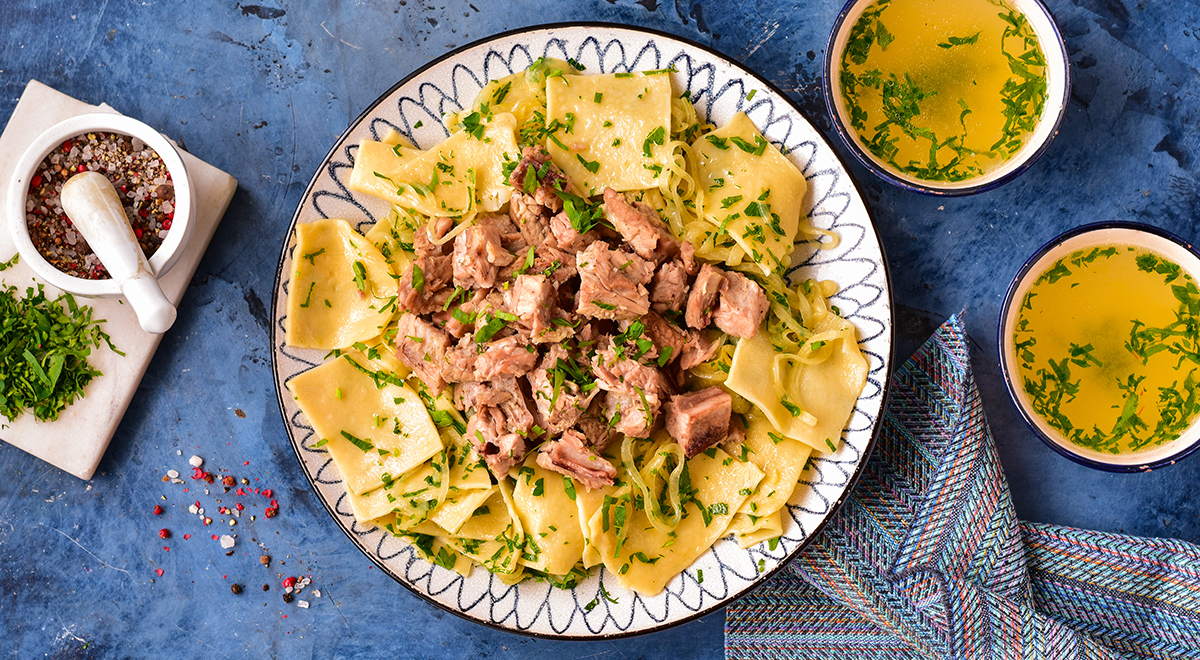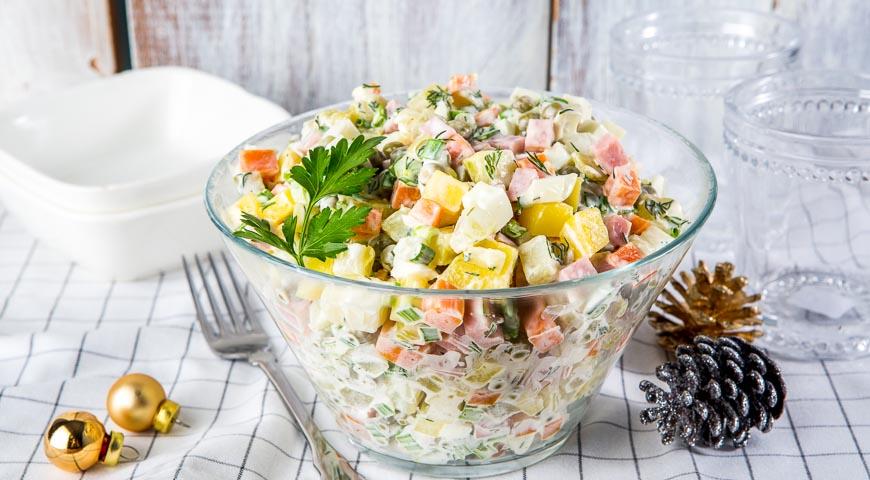As the winter arrives upon the Kazakhstan landscapes, the spirit of the upcoming New Year fills the air, bringing families together to prepare for the celebration of the long-awaited event. Kazakhstan, known for its cultural diversity, celebrates the New Year twice. It is celebrated once, according to European tradition, on January 1, and the second time on March 22, on the Vernal Equinox. When it comes to cuisine, traditional Kazakh New Year’s recipes are a delightful fusion of nomadic influences, festive feasts, and Central Asian flavours. Let me embark on a culinary journey of Kazakh flavours during this magical season.
1. Beshbarmak
Besbarmak translates as “five fingers” to Kazakh and to Turkic languages in general; thus, traditionally, this dish is eaten with hands. This hearty dish consists of boiled meat, usually horse meat or beef, served on a bed of thin pasta sheets and accompanied by potatoes and onions. Let’s have a closer look on the recipe:
(For 6-8 portions)
- Beef/ Horse meat – 1.5 kg
- Onion – 3 pcs.
- Potatoes – 3 pcs.
- Salt and pepper – to taste
- Water for broth: 2.5 l
- for dough:
- Egg – 1 pc.
- Flour – 500 g
- Salt – 1 tbs.
- Water – 200 ml
Directions
Place the meat,1 peeled onion and the potatoes in a saucepan. Fill with 2.5 liters of water.
Bring to a boil and skim off the foam. Cover with a lid and cook the broth for 2-3 hours over low heat.
Add 1 egg, 1 tablespoon of salt and 200 ml of water to the sifted flour and knead into a thick dough. Wrap the dough and let it rest for 30 minutes.
Divide the dough into 3 parts. Roll each part into a thin layer, the thickness of which should be approximately 1-1.5 mm.
Cut the dough into rectangles approximately 5-7 cm each. Leave the dough for 20 minutes to dry.
Remove onions and meat from the prepared broth. Separate the meat from the bones and divide into small pieces. Cut 2 onions into half and pour in the broth so that the onion is completely covered.
Bring to a boil, add salt and pepper to taste. Cook for 2 minutes over low heat, then remove from heat. Cook the dough rectangles until tender in boiling broth, in 2-3 batches, about 2 minutes each.
Remove the finished rectangles from the broth with a slotted spoon and place on a large plate. Place pieces of meat on top of the dough, and onion stewed in broth on top of the meat.
Sprinkle the finished dish with green onions (optional) and serve the broth separately. Bon appetite!
2. Olivier Salad
Not a single New Year’s feast in Kazakhstan is complete without Olivier salad – here is the quick and easy recipe:
(for 6-8 portions)
- Boiled potatoes – 4 pcs. average
- Carrot – 1 pc.
- Hard-boiled eggs – 4 pcs.
- Boiled sausage “Doctor’s” – 300 g
- Pickled cucumbers (can be fresh) – 4 pcs.
- Canned green peas – 1 jar weighing 200 g
- Mayonnaise – 3-4 large tablespoons
- Parsley and dill leaves (optional)
- Freshly ground black pepper and salt – to taste
Directions
Boil carrots and potatoes. Boil eggs hard.
Cut eggs, potatoes, sausage, and carrots into small cubes of equal size. Chop the cucumbers and squeeze a little so that there is not a lot of liquid in the salad.
Add peas to the chopped ingredients (drain the water from them), chop the greens, mix with mayonnaise. Add salt and pepper to taste. Place in the refrigerator for 1 hour.
Mix everything and serve!
3. Herring under a Fur Coat or Dressing Herring Salad
Alongside Olivier, Dressing Herring is another delicious salad loved by everyone in Kazakhstan.
(for 6 portions)
- Beetroot – 6 pcs.
- Carrots – 6 pcs.
- Eggs – 12 pcs.
- Mayonnaise – to taste
- Onions – 2.5 pcs.
- Potatoes – 6 pcs.
- Herring – 1.2 kg
Directions
Boil beets, carrots, potatoes, and eggs.
Chop the onion quite finely.
Peel the boiled vegetables. Pass the potatoes and eggs through an egg cutter. Grate the beets and carrots.
Cut the herring into small pieces, removing the bones in advance.
Place the herring on a serving plate first, then the onions, potatoes, eggs, carrots, and beets.
Cover with mayonnaise and refrigerate. Bon appetite!

Those recipes are only a small part of our rich traditional cuisine, which, I hope are going to please everyone with its authenticity and refined taste. In every dish, there is a story, and in every shared meal, there is a celebration of the unique and vibrant culture that defines the New Year in Kazakhstan.





